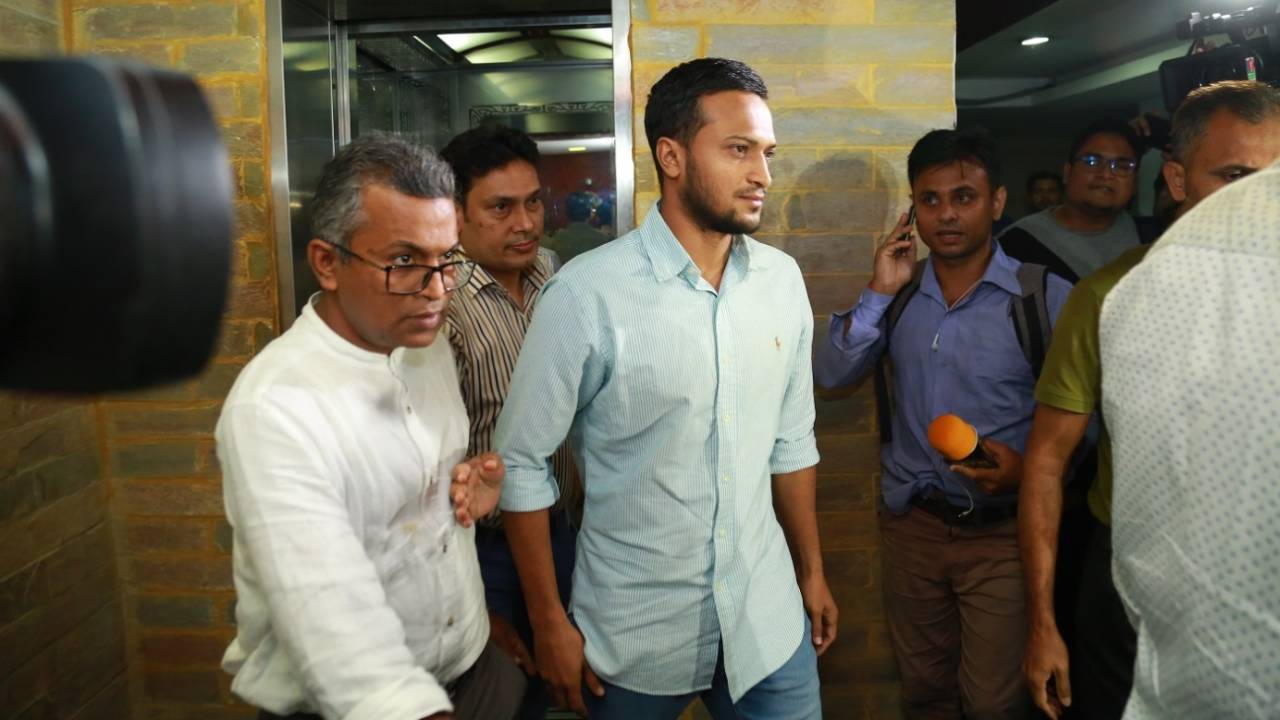A wretched day in Dhaka
Last week Shakib had led an unprecedented strike at the Shere Bangla National Stadium. Days later, his suspension left many in shock and disbelief
Mohammad Isam
Oct 29, 2019, 6:39 PM
Shakib Al Hasan walks into the press conference • BCB
"Shakib, why didn't you report those approaches?"
Shakib Al Hasan looked to his right, ready to answer my question, only to be stopped by BCB director Jalal Yunus. He'd read out his statement - the same words as in the ICC release, this time in Bangla - and they were not going to take any questions. In the claustrophobic reception area of the BCB's Mirpur headquarters, filled with discomfort and disbelief, he went back to being deadpan.
BCB president Nazmul Hassan read his statement, after which another question was put to Shakib. Mahbubul Anam, the BCB director, who was sitting in one of the sofas near the exit of the reception, jumped to stop the journalist.
In the meantime, Shakib had slid through the packed room. Someone asked another question. Shakib replied, and then smiled. He eventually left through the closed-off board offices to the left of the reception, ran down the stairs, dodging the cameras, and sped through the Shere Bangla National Stadium's southern exit. A senior journalist, who has witnessed many ups and downs in Bangladesh cricket, later said he had seen Shakib's bloodshot eyes for a fleeting moment. However, he couldn't quite tell if Shakib was angry.
During his hasty exit, he must have also heard cries of "Shakib! Shakib!" from about a hundred people who had gathered around the stadium to protest the ICC's verdict to ban him from all cricket for two years (with one year of that sentence suspended). They had been gathering around the stadium's main entrance since early evening, and wrote down their messages on posters after the announcement was made. The chanting began soon after, and it gathered pace around the time Shakib and the rest of the BCB top brass left the ground following the press conference.
****
The build-up to this wretched day began when local daily Samakal dropped a front-page bombshell, carrying reports of Shakib's suspension. The BCB denied those reports, but the flurry of activity in the board office was a portent of how things would unfold.
BCB chief Hassan arrived at the board's office by 2pm, and he was followed by his coterie almost immediately. There would be a series of meetings to discuss the tense developments. As the directors entered one by one, and news filtered through from different directions, the country's prime minister, Sheikh Hasina, also weighed in.
"If ICC takes any step, then there will be no scope to do anything for him (Shakib)," she said at a press conference at her official residence, which was held as part of her return from the NAM (Non-Aligned Movement) summit. "It's right that he made the mistake and he realised it. Yet, the BCB will be with him."

Shakib Al Hasan has missed training on two occasions since the players' strike•Getty Images
This statement eased the speculation around Shakib's fate. More reports soon emerged in newspapers and websites and although there was no word from the ICC, BCB, or Shakib until the evening, the writing was on the wall.
As the journalists waited patiently around the grandstand, BCB offices, media lounge and the parking area, the discussion kept going back to the unprecedented player strike that Shakib had led last week, setting the Shere Bangla National Stadium abuzz. Some pertinent questions kept popping up in every discussion.
When did Shakib know that the ICC's ACSU was winding up the investigation and was close to the verdict? Did he know about it before he led the player strike? When did the BCB know about this investigation, and did this information influence BCB chief Hassan into questioning the timing of the strike in every press conference and interview since October 22?
There would be no more answers. As the sun set in Dhaka, the mood became a bit more impatient when Akram Khan, the BCB's head of cricket operations and Russell Domingo, the head coach, turned up to tell reporters that the board has agreed to play a pink-ball Test against India in Kolkata. On another day, the news would have made the headlines. After all, Bangladesh were risking to step into the unknown - only one match has been played in the country with them, the first-class Bangladesh Cricket League final in February 2013.
At about 6.30pm, the ICC sent out the press release, which was received with horror by everyone present in BCB. Ninety minutes later, Shakib made his brief appearance.
Former Bangladesh captain Habibul Bashar, who was present at the selectors' press conference that followed Shakib's, called it the "saddest day in Bangladesh cricket". Akram and chief selector Minhajul Abedin, both former captains, expressed their shock as well.
****
Meanwhile, in Bogra, 194km to the northwest of Dhaka, Mohammad Ashraful made a stroke-filled, unbeaten 150 in a first-class match against Dhaka Metropolis. Ashraful was the last Bangladeshi cricketer to be banned for corruption, in 2014.
Shakib was one of the first people to openly question Ashraful's motives during the fateful BPL match in Chittagong later identified as one of the compromised by the BPL tribunal. Shakib had been a key witness in that case, speaking up against an incident he felt was tarnishing the game. How he must wish he'd done the same this time around.
Mohammad Isam is ESPNcricinfo's Bangladesh correspondent. @isam84
